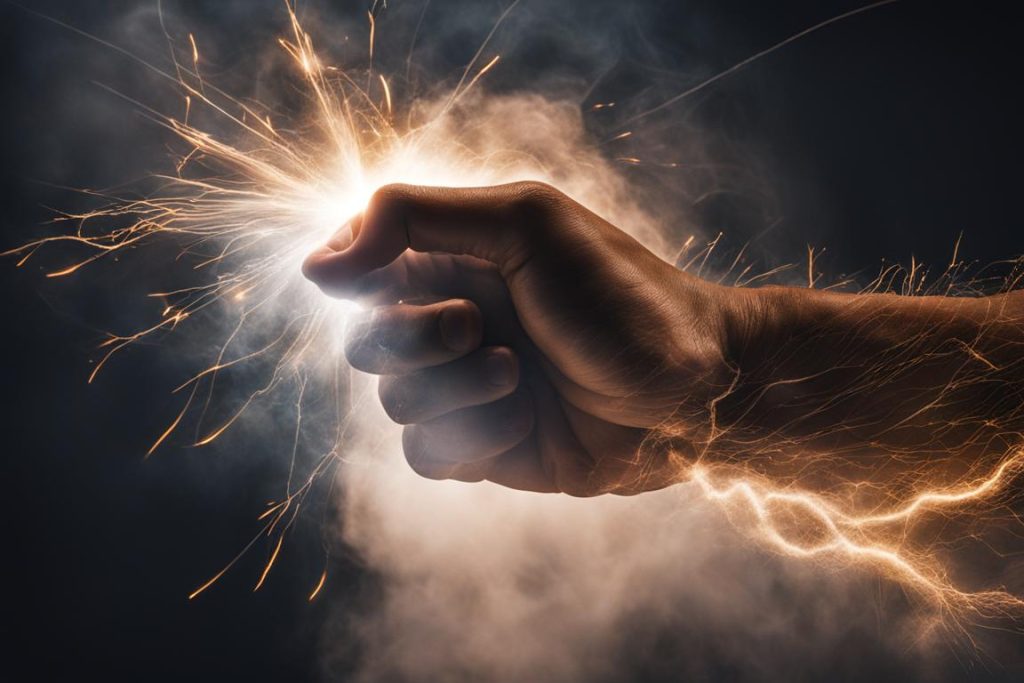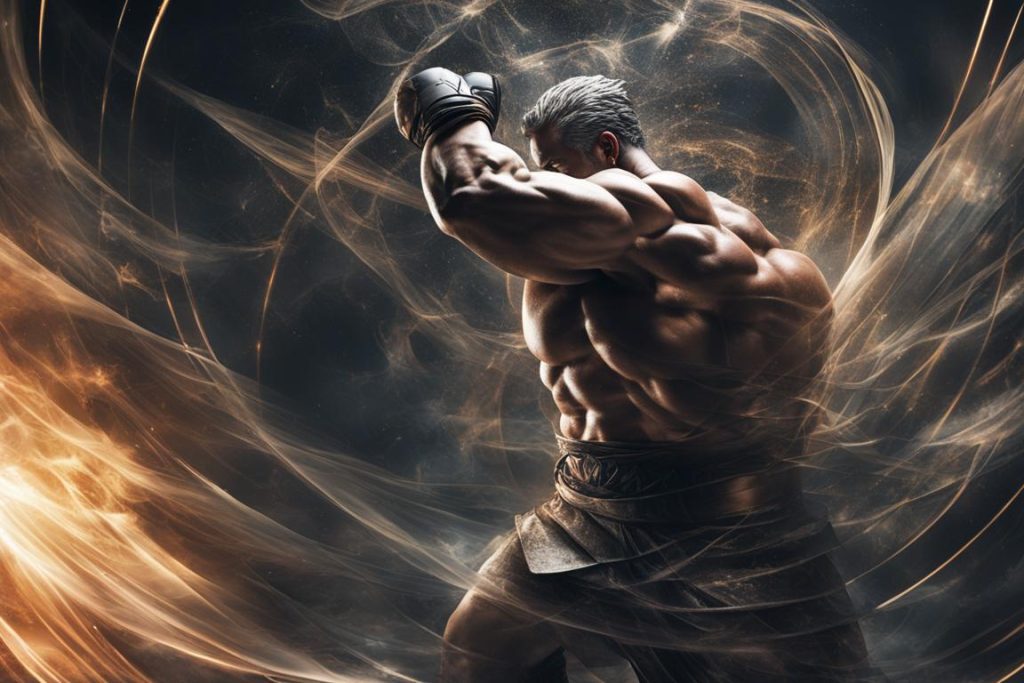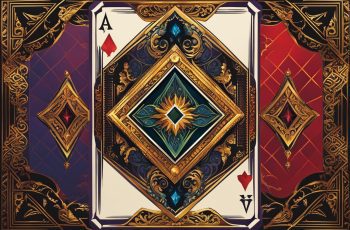In dreams, many people experience the frustration of being unable to throw a punch effectively. This lack of strength and force in dreams is not indicative of any physical weakness or character defect. It is primarily due to neurological factors that affect the strength of our dream-manifested selves. We will explore the reasons behind this dream weakness and delve into the physics and psychology of dream fighting.
Why Can’t I Punch Hard in My Dreams
- Dream weakness is not a reflection of physical strength or training.
- Sensory feedback plays a crucial role in dream punching effectiveness.
- Lucid dreaming techniques can enhance control and abilities in dreams, including punching power.
- Dream fighting may symbolize unresolved conflicts or inner tensions.
- Seeking therapy can provide insights into the psychological meaning of dream punching.
The Role of Sensory Feedback in Dream Punching
When we dream, our physical movements and actions can often feel sluggish and ineffective. This lack of strength and power in our dream punches is not a reflection of our real-world physical limitations, but rather a result of the role of sensory feedback in dreaming. Our brain relies on sensory information from our muscles and nerves to gauge the force and impact of a punch. However, during sleep, this feedback is significantly reduced, leading to a disconnect between our intentions and the execution of our movements.
The thalamus, a part of the brain responsible for transmitting sensory information, inhibits the transmission of motor signals needed for effective punching in dreams. This inhibition makes our dream punches feel weak and ineffectual, as if we were moving through a thick jelly-like substance. The lack of sensory feedback makes it challenging for our brain to accurately perceive the strength and impact of our punches, resulting in a frustrating experience for many dreamers.
In a study conducted by dream researchers, participants reported that the sensation of punching in dreams felt like “throwing punches underwater” or “swimming through molasses.” These descriptions highlight the impact of the lack of sensory feedback on our dream punching abilities. Without the cues that our bodies provide in waking life, our brain is left to rely on guesswork, leading to the perception of weakened punches in dreams.
The Role of Proprioception in Dream Punching
One of the key components affected by the lack of sensory feedback in dream punching is proprioception. Proprioception refers to our sense of body position and movement. In waking life, proprioceptive feedback allows us to accurately gauge the force and impact of our actions. However, in dreams, the reduced sensory input hinders our proprioceptive abilities, making it difficult for our brain to accurately perceive the strength of our punches.
In conclusion, the limitations on dream punch effectiveness stem from the role of sensory feedback in dreaming. The lack of sensory input inhibits our brain’s ability to accurately perceive the force and impact of our punches, resulting in weak and ineffective dream punches. Understanding these limitations can provide valuable insights into the unique aspects of dreaming and the interplay between our physical and mental experiences in the dream realm.
Exploring Lucid Dreaming and Dream Control
Lucid dreaming offers a fascinating way to tap into the power of our dreams and unlock new possibilities. By becoming aware that we are dreaming while in the dream state, we can gain control over our experiences and even enhance our physical abilities, including the power of our punches. Lucid dreaming enables us to bridge the gap between the conscious and unconscious mind, allowing for exploration and self-discovery in a realm where the normal constraints of reality no longer apply.
One technique to induce lucid dreams is to practice metacognition, which involves cultivating a heightened awareness of our thoughts and surroundings. By training ourselves to question our reality throughout the day, we increase the likelihood of doing so in our dreams. This heightened self-awareness serves as a trigger for lucidity, providing us with the opportunity to take control and manipulate our dream environment.
In the context of dream fighting, lucid dreaming can be a game-changer. By recognizing that we are in a dream, we can consciously enhance our dream-fighting abilities, including the strength of our punches. With practice, we can summon the confidence and conviction to throw powerful, impactful punches within the dream realm.
However, it’s important to note that the boundaries and limitations of dream power still exist. While lucid dreaming provides a sense of control, it does not guarantee unlimited strength or invincibility. The dream realm, although malleable, still operates within the confines of our subconscious mind. Understanding and accepting these limitations can help us navigate the dream world with a sense of curiosity and wonder, while also respecting the boundaries of our own inner selves.

The Power of Lucid Dreaming
Lucid dreaming not only grants us the ability to enhance our dream fighting abilities but also offers a platform for personal growth and self-exploration. Through lucid dreaming, we can confront our fears, delve into our subconscious desires, and gain valuable insights into our overall well-being. It opens up a realm where we can consciously shape our dreams and manifest our deepest aspirations, providing a unique avenue for self-discovery and empowerment.
The Psychological Meaning Behind Dream Fighting
When we engage in dream fighting, it’s important to remember that the physical limitations we experience in the dream realm are often symbolic representations of our inner conflicts and unresolved tensions in waking life. Dream fighting can be a manifestation of stress, unresolved arguments, unhappiness with ourselves, or a sense of being out of control. The person or figure we fight in our dreams can represent specific issues or aspects of ourselves that we are struggling with.
By seeking professional therapy, we can gain a deeper understanding of the psychological meaning behind our dream fighting. A therapist can help us unravel the symbolism and provide guidance for resolving these conflicts. Exploring the psychological aspects of dream fighting can lead to personal growth and a greater understanding of ourselves.
“Dream fighting can often reveal underlying emotions and conflicts, offering valuable insights into our subconscious thoughts and emotions.”
It’s important to approach dream fighting with curiosity and a willingness to explore the deeper meanings. Dreams serve as a gateway to our subconscious minds, and by decoding the symbolism behind dream fighting, we can gain a better understanding of ourselves and our emotional landscape. Through therapy and self-reflection, we can begin to address and resolve the underlying issues that our dream fighting represents.
The Power of Symbolism
Dream fighting is just one example of the power of symbolism in our dreams. Our subconscious minds communicate with us through images, emotions, and experiences that can be both confusing and enlightening. By paying attention to the symbolism in our dreams, we can unlock hidden messages and gain insights into our deepest selves. Dream interpretation is a valuable tool for personal growth and self-discovery. Through therapy, self-reflection, and an open mind, we can navigate the intricate web of our dreams and find meaning in even the most seemingly mundane aspects of our dreamscapes.
| Symbol | Meaning |
|---|---|
| Fighting with a loved one | Unresolved conflicts or tensions in the relationship |
| Fighting a faceless opponent | Generalized feelings of stress or anxiety |
| Fighting a shadowy figure | Repressed emotions or fears |
| Fighting oneself | Internal struggles or self-destructive behaviors |
The Power of Flying in Dreams
One of the most intriguing aspects of dreaming is the ability to fly without the need for an airplane. Flying in dreams can be a thrilling and exhilarating experience, evoking feelings of freedom, control, and exploration. This phenomenon often represents a sense of breaking free from limitations and discovering new possibilities in life.
Exploring lucid dreaming techniques can increase the likelihood of experiencing flying in dreams. Lucid dreaming is the state of being aware that you are dreaming while you are still in the dream. By practicing metacognition and increasing our awareness while dreaming, we can gain greater control over our dream experiences, including the power to fly.
During lucid dreams, we can consciously manipulate the dream environment and our dream selves. By visualizing ourselves soaring through the sky or simply intending to fly, we can harness the power of our imagination to take flight. The feeling of weightlessness and the ability to navigate through the dream world can be incredibly empowering and awe-inspiring, leaving a lasting impact on our dream experiences.
Unlocking the Potential of Dream Flight
To increase the likelihood of flying in dreams, it is helpful to establish a consistent dream journaling practice. By recording and reflecting on our dreams, we can become more attuned to our dream patterns and themes. This awareness can then be applied to recognize when we are in a dream and activate lucidity.
Additionally, incorporating reality checks into our daily routine can enhance our ability to recognize dreaming. By regularly questioning the nature of our reality and performing reality checks, such as looking at our hands or trying to push a finger through our palm, we can develop a habit of critical awareness that carries over into our dream state.
Ultimately, the power of flying in dreams goes beyond the physical realm. It represents the boundless nature of our imaginations and the limitless possibilities that exist within our minds. By embracing the world of dreams and cultivating lucidity, we can unlock the full potential of our dream experiences and soar to new heights.
Dream Punching and Physical Strength in Dreams
In the realm of dreams, the experience of punching with strength and force can be elusive. This dream weakness, however, does not reflect our actual physical capabilities or training. Dream punching is influenced by various factors that impact our dream strength and perceived physical limitations.
One key factor affecting dream punching is proprioceptive feedback, which is the awareness of our body’s position and movement. During sleep, the brain receives limited sensory feedback from our muscles and nerves, making it difficult to gauge the force and impact of our punches. This lack of sensory input can result in sluggish and ineffective dream movements, creating the perception of physical weakness.
Moreover, the coordination between our brain and muscles in dreams is influenced by neurological processes. The thalamus, responsible for transmitting sensory signals, inhibits the transmission of motor signals needed for effective punching in dreams. This interference further contributes to the perceived lack of physical strength.

Factors Affecting Dream Punching and Physical Strength
| Factor | Description |
|---|---|
| Proprioceptive Feedback | Limited sensory feedback during sleep affects perception of force and impact |
| Neurological Processes | The thalamus inhibits transmission of motor signals for dream punching |
| Psychological Factors | Inner conflicts, stress, and unresolved issues can affect dream strength |
It’s important to note that dream punching is influenced not only by physical factors but also by psychological ones. Dreams often reflect our inner conflicts, stress, and unresolved issues. Psychological factors can contribute to the perception of physical weakness in dreams, as they manifest symbolically through dream experiences, including dream fighting.
In conclusion, the inability to punch effectively in dreams is not a reflection of our true physical strength or capabilities. It is influenced by a combination of proprioceptive feedback, neurological processes, and psychological factors. Understanding these factors can help us interpret the deeper meanings behind dream punching and recognize the unique nature of the dream realm.
Dream Punching and the Symbolism Behind It
When we experience the frustration of being unable to throw a punch effectively in our dreams, it is important to understand that this dream weakness carries symbolic meaning. Dream punching can represent deeper emotions and conflicts that we may be grappling with in our waking lives. It may signify feelings of powerlessness, a lack of confidence, or difficulties with self-expression. Exploring the symbolism behind dream punching can offer valuable insights into our subconscious thoughts and emotions.
Just as dreams provide a window into our inner world, dream punching serves as a metaphorical expression of our internal struggles. The person or figure we fight in our dreams often represents specific issues or aspects of ourselves that we may be battling with. By decoding the symbolism of dream punching, we can gain a deeper understanding of the underlying emotions and conflicts that are affecting us.
Dream punching can be a powerful tool for self-reflection. It allows us to access and process our subconscious thoughts and emotions, enabling personal growth and development.
Consulting with a professional therapist or dream analyst can be beneficial in unraveling the meanings behind dream punching. They can provide guidance and support in interpreting the symbolism and exploring its relevance to our lives. By delving into the psychological aspects of dream punching, we can gain valuable insights that can contribute to our personal growth and well-being.

Decoding the Symbolism of Dream Punching
Dream punching carries unique symbolism that can vary based on individual experiences and personal associations. However, there are some common interpretations that can provide a general understanding of its meaning:
- Dream punch strength: The strength or effectiveness of our dream punches may reflect our perceived abilities to overcome challenges and assert ourselves in waking life.
- Dream fighting abilities: Our fighting skills in dreams can represent our resilience, assertiveness, or passive-aggressive tendencies in dealing with conflicts and challenges.
- Dream power limitations: The limitations or struggles we encounter in dream fighting can symbolize our feelings of powerlessness, lack of control, or obstacles hindering our progress in waking life.
By examining the symbolism behind dream punching and relating it to our personal experiences, we can cultivate self-awareness and gain a deeper understanding of ourselves. This can empower us to address and overcome the underlying issues that may be affecting our waking life.
Dream Weakness and Its Impact on Dream Interpretation
Dream weakness, particularly the inability to punch hard in dreams, is a common experience for many individuals. It can be frustrating and leave us with a sense of powerlessness. However, it is important to understand that this dream weakness is not a reflection of our actual physical strength or abilities. Instead, it is rooted in the neurological factors that govern our dream experiences.
One of the main reasons behind dream weakness is the lack of sensory feedback that our bodies provide during sleep. Our brain relies on this feedback to gauge the force and impact of a punch. Without it, our movements in dreams become sluggish and ineffective. The thalamus, a part of the brain responsible for sensory output, inhibits the transmission of motor signals needed for punching in dreams, making it feel like we are fighting underwater.
Understanding dream weakness is crucial when interpreting our dreams. It is important to consider the wider context and symbolism of our dream experiences. Dream punching may not be about physical strength at all, but rather a reflection of inner conflicts and unresolved tensions in our waking lives. It can signify stress, lack of confidence, or a feeling of being out of control. By exploring the deeper meanings behind dream punching, we can gain valuable insights into ourselves and our subconscious minds.
In conclusion, dream weakness, including the inability to punch hard in dreams, can impact the interpretation of our dreams. It is essential to look beyond the surface-level physical limitations and explore the psychological and emotional aspects of our dream experiences. Lucid dreaming techniques and seeking professional guidance can be valuable tools in deciphering the symbolism and meaning behind dream punching. By delving deeper into dream weakness, we open ourselves up to personal growth, self-discovery, and a better understanding of our subconscious thoughts and emotions.
Conclusion
In conclusion, the inability to punch hard in dreams is a common occurrence that is not indicative of any physical weakness or character flaw. This dream weakness is primarily due to neurological factors that affect the strength and force of our dream-manifested selves. The lack of sensory feedback during sleep hinders the brain’s ability to gauge the impact and effectiveness of our punches, resulting in sluggish and ineffective movements.
However, by exploring lucid dreaming techniques and increasing our awareness while dreaming, we can enhance our dream fighting abilities and potentially improve our dream punch strength. Lucid dreaming offers a unique opportunity to gain control over our dreams and tap into the power of our subconscious minds.
It’s important to note that dream fighting can be symbolic, reflecting underlying emotions and conflicts. It may represent feelings of powerlessness, lack of confidence, or difficulties with self-expression. Understanding the symbolism behind dream punching can provide valuable insights into our subconscious thoughts and emotions, leading to personal growth and development.
Overall, dream weakness, including the inability to punch hard in dreams, is rooted in the physiological and psychological aspects of dreaming. By delving into the neuroscience and symbolism of dream fighting, we can harness the power of our dreams and gain a deeper understanding of ourselves.
FAQ
Why can’t I punch hard in my dreams?
The lack of strength and force in dreams is primarily due to neurological factors that affect the strength of our dream-manifested selves. It is not indicative of any physical weakness or character defect.
What role does sensory feedback play in dream punching?
Dream punching is hindered by the lack of sensory feedback that our bodies provide during sleep. Without physical stimulus, the brain relies on guesswork, resulting in sluggish and ineffective movements.
Can lucid dreaming improve dream fighting abilities?
Yes, by practicing metacognition and increasing awareness while dreaming, you can gain greater control over the content and experiences in your dreams. Lucid dreaming techniques can be used to enhance dream punching power.
What does dream fighting symbolize?
Dream fighting can often reflect inner conflicts and unresolved tensions in our waking lives. It may signify stress, unresolved arguments, unhappiness with ourselves, or a sense of being out of control.
Why do we sometimes dream of flying?
Flying in dreams often represents a sense of freedom, control, or a newfound experience in life. By exploring lucid dreaming techniques, you can increase the likelihood of experiencing the exhilarating sensation of flying in your dreams.
Does dream punching reflect real-world physical strength?
No, dream punching is not related to real-world physical limitations. It involves a complex interplay of factors, including proprioceptive feedback, coordination, and neurological processes.
What does dream punching symbolize?
Dream punching can represent feelings of powerlessness, lack of confidence, or difficulties with self-expression. Understanding the symbolism behind dream punching can offer valuable insights into our subconscious thoughts and emotions.
How does dream weakness impact dream interpretation?
Dream weakness, including the inability to punch hard in dreams, should be considered within the wider context and symbolism of dream experiences. It can reveal deeper psychological or emotional themes and provide opportunities for personal growth.




